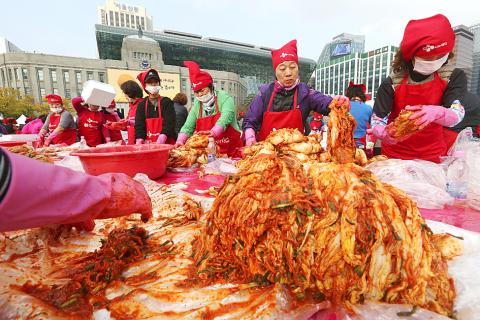South Korea’s trade deficit in kimchi, its proud traditional side dish of fermented cabbage, reached an all-time high last year as low-priced Chinese imports flooded the market, statistics showed yesterday.
The spicy foodstuff is emblematic of Korean cuisine and accompanies almost every meal served in the nation, whatever its culinary origins, with kimchi-making still an important annual ritual for many families.
However, the commercial market has been deluged by Chinese producers in recent years, resulting in what has been dubbed the “kimchi deficit.”

Photo: AP
South Korea imported more than 275,000 tonnes of kimchi last year, 99 percent of it from China, the Korea Customs Service (KCS) said, and exported just more than 24,000 tonnes.
The deficit stood at US$47.3 million by value, up 11 percent year-on-year and the largest since the KCS began tracking the data in 2000.
Price is a major factor in the trade, with imports costing just US$0.50 per kilogram in 2016, according to Korea Agro-Fisheries & Food Trade Corp, while exports — primarily destined for Japan — averaged US$3.36 per kilogram.
According to South Korea’s World Institute of Kimchi, 89.9 percent of the kimchi purchased by South Korean restaurants in 2016 was imported from China.
The kimchi trade first went into deficit in 2006, triggering soul-searching and a headline-grabbing scandal.
UNESCO inscribed South Korean kimchi on its intangible cultural heritage list in 2013, saying: “It forms an essential part of Korean meals, transcending class and regional differences.”
There are regional differences in the product, UNESCO said, and the specific methods and ingredients are considered an important family heritage, typically transmitted from a mother-in-law to her newly married daughter-in-law.

Sweeping policy changes under US Secretary of Health and Human Services Robert F. Kennedy Jr are having a chilling effect on vaccine makers as anti-vaccine rhetoric has turned into concrete changes in inoculation schedules and recommendations, investors and executives said. The administration of US President Donald Trump has in the past year upended vaccine recommendations, with the country last month ending its longstanding guidance that all children receive inoculations against flu, hepatitis A and other diseases. The unprecedented changes have led to diminished vaccine usage, hurt the investment case for some biotechs, and created a drag that would likely dent revenues and

Global semiconductor stocks advanced yesterday, as comments by Nvidia Corp chief executive officer Jensen Huang (黃仁勳) at Davos, Switzerland, helped reinforce investor enthusiasm for artificial intelligence (AI). Samsung Electronics Co gained as much as 5 percent to an all-time high, helping drive South Korea’s benchmark KOSPI above 5,000 for the first time. That came after the Philadelphia Semiconductor Index rose more than 3 percent to a fresh record on Wednesday, with a boost from Nvidia. The gains came amid broad risk-on trade after US President Donald Trump withdrew his threat of tariffs on some European nations over backing for Greenland. Huang further

Macronix International Co (旺宏), the world’s biggest NOR flash memory supplier, yesterday said it would spend NT$22 billion (US$699.1 million) on capacity expansion this year to increase its production of mid-to-low-density memory chips as the world’s major memorychip suppliers are phasing out the market. The company said its planned capital expenditures are about 11 times higher than the NT$1.8 billion it spent on new facilities and equipment last year. A majority of this year’s outlay would be allocated to step up capacity of multi-level cell (MLC) NAND flash memory chips, which are used in embedded multimedia cards (eMMC), a managed

CULPRITS: Factors that affected the slip included falling global crude oil prices, wait-and-see consumer attitudes due to US tariffs and a different Lunar New Year holiday schedule Taiwan’s retail sales ended a nine-year growth streak last year, slipping 0.2 percent from a year earlier as uncertainty over US tariff policies affected demand for durable goods, data released on Friday by the Ministry of Economic Affairs showed. Last year’s retail sales totaled NT$4.84 trillion (US$153.27 billion), down about NT$9.5 billion, or 0.2 percent, from 2024. Despite the decline, the figure was still the second-highest annual sales total on record. Ministry statistics department deputy head Chen Yu-fang (陳玉芳) said sales of cars, motorcycles and related products, which accounted for 17.4 percent of total retail rales last year, fell NT$68.1 billion, or